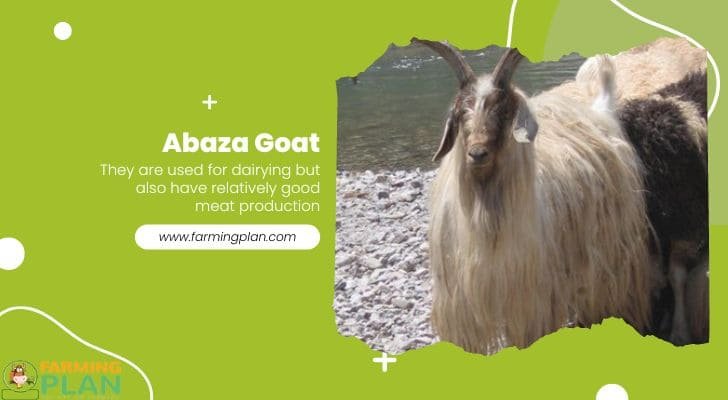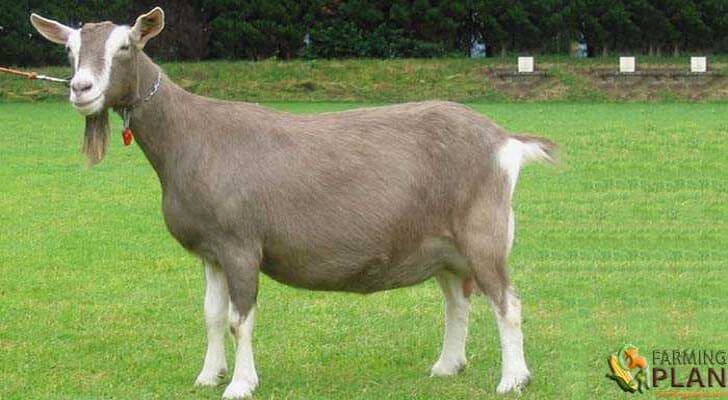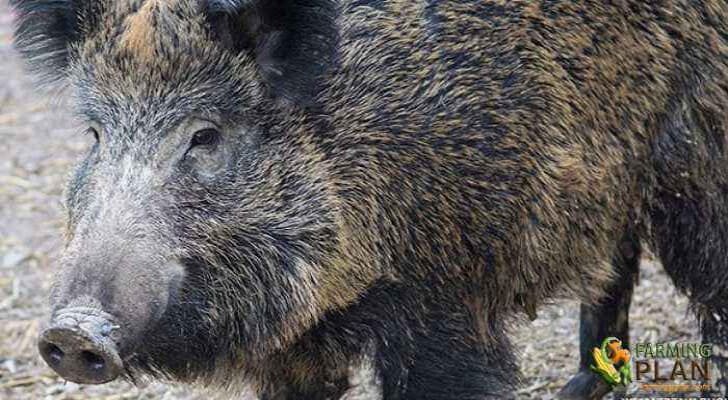When you think of animals that come from Russia, the first thing to come to mind is most likely bears. But did you know there’s a small but tough breed of goat that hails from this region as well? Abaza goats are renowned for their hardy nature, capable of navigating rough terrain and adverse weather conditions while providing excellent meat and milk yields. In this blog post, we’ll learn more about these remarkable animals and how people are working to preserve them around the world.

Introducing of Abaza Goat
Abaza Goats are true survivors! This hardy breed originated in the mountainous regions of central Russia and is still found in those harsh conditions today. A small but hardy animal, the average Abaza goat stands between twenty-two and twenty-six inches high at the shoulder, with bucks weighing around sixty pounds and does seventy-five. These goats have thick coats to protect them from the cold climate and their small size makes it easy for them to maneuver through rugged terrain. While they may not be as large or showy as other breeds, their strength, agility, and ability to withstand extreme temperatures make them a favorite among a variety of farmers across Russia. Their milk yields rival those of larger breeds and their meat has a flavor that is tasty enough to make them popular on the dinner table. Abaza Goats are truly one tough breed!
Characteristics
Abaza Goats are among the oldest breeds of goat, originating from Abazinskiy Krai, Russia. The Abaza Goat is known for its ability to survive harsh climates and feed on an assortment of different plants and shrubs. Abaza Goats have sturdy bodies with long legs for covering large distances and resistance against weather elements. They are typically horned, have black or dark brown coloring, and their undercoat is a white or silver-gray color. Abaza Goats show excellent levels of fertility and usually produce two colorful offspring each year. Whereas playful, Abaza Goats can form strong emotional bonds with people over some time – making them highly sought-after companions amongst farm owners and pet lovers alike.
Usage
Abaza Goats, native to Russia, are a unique breed of goat that is small but tough. Not only do they have a compact size, but they also a reputation for being hardy and able to survive difficult winters due to their thick fur. Over the years, these goats have been used by herders in Russia for their meat and milk products, as well as their hide. The breed is known for producing a healthy amount of milk with a high butterfat content which can be used to make cheese and other dairy-based products. In addition to its various agricultural uses, the Abaza Goat is also being studied for its potential medical applications. Its long-lasting health benefits could potentially lead to new treatments and methods of healing shortly.
Feed
A traditional diet for Abaza goats consists primarily of grass and hay, supplemented in the winter months with grains such as oats and wheat. Goats are frequent grazers, often found nibbling away at plants most other animals find unfavorable, making them extremely well-suited to taking care of rough vegetation throughout the year. Since Abaza goats tend to be smaller than other breeds, they require marginally less feed to sustain themselves. However, that doesn’t mean they don’t need quality food; analyzing the production costs of grain or hay can help determine the best choice for a particular condition or herd size, maximizing productivity without overdoing expenditures on feed. With an adequate diet determined and consistently provided, these small but tough animals remain capable of exceptional performance in both meat and dairy production!
Special Feature
Abaza Goats are a special breed of goat that comes from the Republic of Adygea in southwestern Russia. They are known for their small size and toughness, making them desirable to use on small farms. Abaza Goats are resistant to disease, adapt to various climates, and can survive even on low-quality pasture. Their meat is leaner than other breeds but still has a flavor similar to lamb, making it appealing to many people. Abaza Goats have become a popular choice in recent years due to their hardy nature and delicious meat. Whether you’re looking for a tough animal with a unique flavor or just something small to fill a farm, Abaza Goats should be your first pick!
Facts about Abaza Goat
Abaza Goats are a unique breed of goat originating from the North Caucasus mountain range in Russia. Despite their small size – they typically grow to around 60 cm in height and 90cm in length, these hardy animals have an elegant presence with a long wavy coat and curved horns pointing backward. Abaza goats are renowned for their strong temperament, being very hardy and resilient to harsher climates. They are also known for their extraordinary productivity, producing up to two times more milk than other breeds of goat. It’s no wonder Abaza goats have become increasingly popular as companion animals and as sources of dairy products around the world.
Breeders & Market Demand in Russia
Abaza Goats are sturdy and resilient animals, which have grown increasingly popular on the Russian market and among breeders in recent years. These goats have a unique and hardy genetic makeup, making them great for harsh climates, such as those found in many parts of Russia. Breeding Abaza Goats has become a highly profitable endeavor across the country, with frequent sales at agricultural fairs and markets throughout Russia. Almost overnight, this breed has grown to become a very sought-after commodity among current and potential farmers alike. Though originally from regions of southern Russia, these resilient animals have now been introduced almost all across the nation due to their ability to flourish in harsh environments. As such, demand for Abaza Goats continues to rise as those seeking livestock recognize their wealth of advantages.
Challenges of Keeping Abaza Goat
Keeping Abaza Goats can be quite a challenge, but many farmers across Russia reap the rewards of their hard work. Not only are the animals small in size and tough by nature, they are also highly resistant to winter temperatures, making them an ideal breed for some of the colder parts of the country. They require specialized care due to their active and curious natures, so proper shelter must be provided. In addition, these goats may need supplemental nutrition if pasture is scarce or of poor quality. It takes dedication from both shepherd and animal, but when done right there is a strong bond between them both that makes looking after Abaza Goats an unforgettable experience.
Some Common Health Issues with Abaza Goat
Abaza Goats are small but tough animals from Russia that make great pets. Unfortunately, due to their size, they can be prone to some health issues. Owners need to be aware of the common risks and routine care that should be taken. Some of the most common health issues experienced by Abaza Goats include parasites, dental problems, hoof and joint ailments, poor nutrition, and illnesses like meningeal worms. Proper care is essential in keeping these animals healthy and happy, so owners should regularly inspect for signs of illness as well as provide a balanced diet and access to raw materials such as straw or hay for chewing. With careful attention and monitoring of their environment, Abaza Goat owners will have healthy, happy animals for many years!
Benefits of Owning an Abaza Goat
Owning an Abaza goat can be an incredibly rewarding experience. Native to the rugged, often cold climate of Russia, they are small in size yet remarkably tough animals that make a great addition to any small farm or homestead. Unlike many other breeds of goats, Abaza goats require minimal specialized care and have very low maintenance costs for feeding and healthcare, making them ideal for those who may not have the resources or experience to invest in higher-maintenance breeds. They are also prolific breeders and produce numerous offspring, making them ideal for farmers looking to increase their flock quickly. Overall, if you’re looking for a durable and economical animal to enhance your home or farm, owning an Abaza goat is something worth considering.
FAQ
What is an Abaza Goat?
The Abaza goat is an ancient breed that originated in the Abaza region of northern Syria and southern Turkey. The most distinguishing feature of the Abaza goat is its red or brown fur, with white spots on the belly and legs. Its age-old popularity is due to its resistance to harsh weather conditions as well as its excellent milk production.
Where do Abaza Goats live?
Abaza goats, also known by their scientific name of Capra aegagrus blythi, are native to the Himalayan mountain range in the Indian Subcontinent. They are commonly found living at altitudes ranging from 1800-3000 meters above sea level and prefer humid climates with cool temperatures. They’re also typically seen inhabiting hilly or mountainous terrain with sparse vegetation, as they require less food than other breeds of goat.
How do Abaza Goats reproduce?
Abaza goats, like many mammals, reproduce sexually. During the breeding season, which usually lasts from late spring until early autumn for goats in temperate climates, male Abaza goats actively seek out female counterparts to mate with. These males may display a range of behaviors that attract female mates such as strong “butting” displays and posturing.
Conclusion
In conclusion, Abaza goats are small but tough animals from Russia. They’re known for their vast and diverse uses, such as cheese, meat, and milk production. Owners also love that they require relatively simple feed management because of their non-selective grazing habits. A unique feature that makes them stand out from other goat breeds is their peculiar size— small body but tall legs. A wide range of factors has led to the popularity of Abaza goats amongst breeders in Russia. But, like any pet or livestock, some challenges come with keeping Abaza goats – health issues like salmonella infestations or cold spells, and sometimes a high demand on the animal markets can cause an increase in market price too. Nonetheless, owning an Abaza Goats has lots of long-term benefits such as good quality meat food source and better disease resistance due to genetics which allow them to survive when others don’t. So if you live in an area with harsh yet livable climates, breathing new life into your homestead could be as simple as getting yourself some Abaza Goats!


